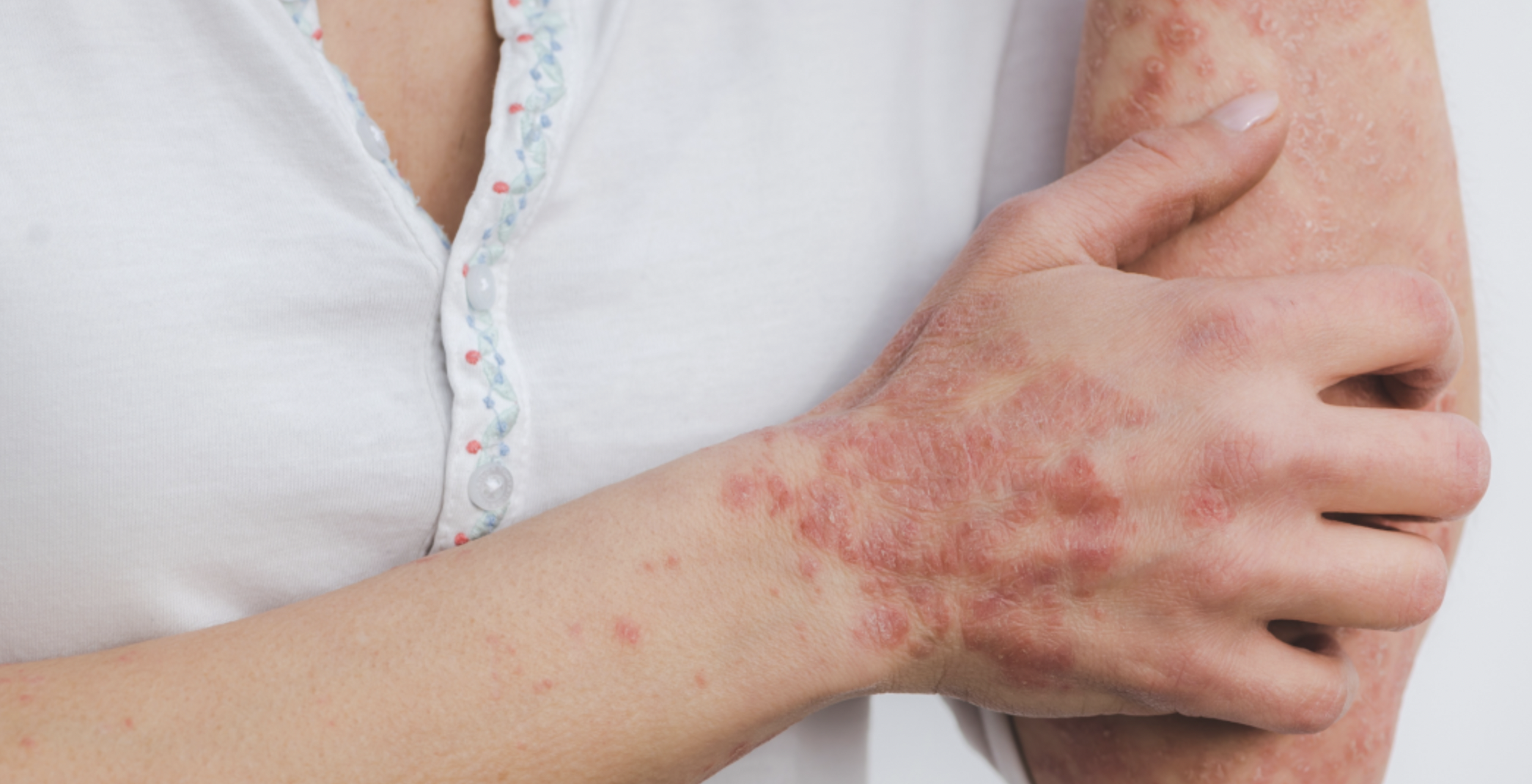Psoriasis is a chronic autoimmune condition that affects millions of people worldwide. It occurs when the immune system mistakenly attacks healthy skin cells, accelerating their life cycle and causing a rapid buildup of cells on the skin’s surface. This can lead to painful and itchy patches, which are often difficult to manage. Despite numerous available treatments, such as light therapy, systemic drugs, and topical lotions, many people still find it challenging to control their psoriasis effectively. In response to this need, Cuba has developed Coriodermina, a more efficient and non-intrusive medication that offers substantial improvements for psoriasis patients.

Understanding Psoriasis
Psoriasis is a chronic, relapsing, and immune-mediated (abnormal immune system response) skin disease that typically causes the development of thickened, red patches covered with silvery scales. Though they can affect any portion of the body, these lesions typically show up on the lower back, scalp, elbows, and knees. The exact etiology of psoriasis is not entirely understood, but it is believed to involve a combination of genetic predisposition and environmental triggers. Factors such as stress, skin injuries, infections, and certain medications can exacerbate the condition.
The Challenges of Managing Psoriasis
Traditionally, managing psoriasis involves a multifaceted approach, including topical treatment, phototherapy, and systemic medication, tailored to the severity of the condition. Despite these treatments, however, many patients experience limited success, highlighting the need for more effective and innovative solutions.
The Birth of Coriodermina
Coriodermina was developed in Cuba by Dr. Carlos Miyares Cao at the Placental Histotherapy Centre, part of Cuba’s thriving biotechnology industry renowned for producing ground-breaking medical treatments. This innovation stands as a demonstration of Cuba’s extensive expertise in immunology and dermatology, offering a novel approach to treating psoriasis.
How Coriodermina Works
Coriodermina is a topical treatment designed to modulate the immune response that triggers psoriasis. Unlike conventional treatments that focus mainly on symptom relief, Coriodermina aims to address the root cause of the condition by targeting specific pathways involved in the inflammatory response. This treatment helps to reduce inflammation, slow down the rapid turnover of skin cells, and promote healing.
Coriodermina is a water-soluble gel derived from human placental tissue. It works by inhibiting the development of psoriatic lesions and regulating the speed of epidermal cell reproduction. This regulation is achieved by neutralizing chemical mediators involved in the inflammatory process, such as cytokines and neuropeptides.
Coriodermina works by:
1. Penetration of the Epidermis
When applied to the skin, Coriodermina first penetrates the stratum corneum, the epidermis’ outermost layer. Although this layer serves as a protective barrier, the small, bioactive molecules in Coriodermina are made to penetrate it effectively.
- Permeation Through Skin Layers
After penetrating the stratum corneum, Coriodermina’s active compounds permeate through the deeper layers of the epidermis and into the dermis (the middle layer of skin). The blood arteries found in the dermis facilitate the absorption of these compounds into the bloodstream.
3. Immune Response Modulation
Psoriasis is driven by an overactive immune system that leads to chronic inflammation. Coriodermina works by neutralizing chemical mediators, such as neuropeptides and cytokines, that are involved in the inflammatory process. involved in the inflammatory process. By doing so, it helps to reduce inflammation, which is a major factor in the quick turnover of skin cells.
- Regulating Skin Cell Reproduction
One of the main characteristics of psoriasis is the rapid proliferation of skin cells. Coriodermina slows down the rate at which epidermal cells divide, hence preventing the formation of psoriatic lesions. This is achieved through the active compounds derived from human placental tissue, which help to normalize the skin cell life cycle, preventing the rapid buildup of cells on the skin’s surface.
5. Promoting Healing and Repair
The ability of placental tissue to regenerate aids in promoting healing and restoration of damaged skin. This enhances the general health and appearance of the skin while reducing redness, scaling, itching and irritation.
Coriodermina’s Efficacy
Many participants reported an overall improvement in their quality of life.
Coriodermina has shown effectiveness in approximately 84% of cases, with some patients reporting complete disappearance of lesions after two years of consistent application. This medication does not have known side effects and is safe for use by people of all ages, including children, the elderly, and pregnant or breast-feeding women. It can be used alongside other medications, except for psoralens, corticosteroids, and cytostatic. This broad applicability makes Coriodermina a particularly attractive option for patients who may not tolerate systemic medications well.
Advantages of Coriodermina
- Targeted Action: Coriodermina’s ability to modulate the immune response specifically addresses the root cause of psoriasis rather than just treating symptoms.
- Reduced Side Effects: As a topical treatment, Coriodermina minimizes the risk of systemic side effects, making it safer for long-term use.
- Improved Quality of Life: Patients using Coriodermina have reported significant improvements in their daily lives, with reduced discomfort and visible symptoms.
Impact on Global Health
The development of Coriodermina underscores Cuba’s contributions to global health, particularly in the field of dermatology. As the treatment gains international attention, it holds the potential to become a game-changer for psoriasis patients worldwide.
Conclusion:
Coriodermina represents a significant advancement in the treatment of psoriasis, offering hope to millions of people affected by this chronic condition. Coriodermina offers patients an opportunity to enhance their quality of life by specifically addressing the underlying cause of psoriasis instead of just treating its symptoms. Its development is a testament to Cuba’s scientific ingenuity and commitment to enhancing global health. For people suffering with psoriasis, the treatment with Coriodermina offers hope of an improved quality of life.

One comment
Ali Bozanoğlu
December 26, 2024 at 8:38 pm
Ben yeni başkadım kullanmaya coriodermina yı umarım iyileştirir